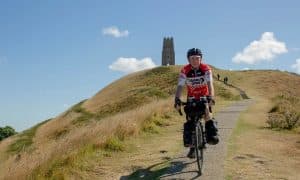Within months of retiring as a mental health nurse, Len Collingwood began a 13,000km solo cycle ride. But that wasn’t the feat that got him into Guinness World Records…

The Guardian reports that Len Collingwood, a clinical nurse specialist in psychotherapy, retired on his 65th birthday. He had made a deal with his wife, Sally: she would train as a yoga teacher and he would “start out as an adventure cyclist”.
Four months later, he set off on a 13,000km cycle ride from Ulaanbaatar in Mongolia to Edinburgh, much of it roughly shadowing Marco Polo’s Silk Road. No sooner had he started out than a snowstorm hit. He hid in his tent, wearing every item of clothing he had packed. At -18C it was too cold to venture outside to cook. He survived the next 48 hours by eating a “massive bag of Snickers and Crunchies” his colleagues had given him when he retired.
So it is a surprise to hear Collingwood say that he has never feared for his life. Except occasionally when a car veered too close, that is. Surely there were days on that six-month journey when he couldn’t face the saddle?
“Never. There’s always something to be curious about,” he says. “And I’m very happy in my own company.”
Collingwood has minimised his equipment, often using tips from mountaineers. On very wet or windy nights, he might sleep in a culvert. In 2018 he pedalled solo in a single-speed rickshaw from Edinburgh to Istanbul to earn a place in Guinness World Records.
“There are very few records a man over 60 can break,” he says.
He turns 71 this year. As we speak, he is perched on the sea wall in Penzance, Cornwall, about to pedal to Land’s End to begin the 1,407km trip to John O’Groats. It sounds arduous but he insists “it’s not a lot of effort. The gearing is so low, it’s just a matter of spinning the wheels.”
Still, they don’t spin on their own. His daughter – like Sally, a yoga teacher – has suggested weights to maintain muscle mass. He plans to start in the autumn.
His son, an ultra-distance cyclist, keeps him up to speed on the latest technology. They each came to cycling independently of one another. “If there is a shared inspiration, it’s the humble bicycle that has the capacity to enable the rider to travel vast distances fast or slow,” Collingwood says.
His parents never cycled. His older sister had a bike that he rode back when the handlebars were higher than his head, always going “a bit further down the road, a bit further”.
But the biggest influence, he thinks, was a Ladybird book on Marco Polo that he borrowed from Everton library when he was six.
It was the incongruity of Italian clothes and camels that caught Collingwood’s eye. The Guinness Book of Records, as it was then, was another favourite: “I would go over and over it.”
Collingwood was a precocious reader, but grammar school was not a happy place for him. His family could not afford the uniform and he felt conspicuous.
“I fell in with the rebellious crowd,” he says. At 12, he and his friends bought a motorbike to ride around the fields near his home in
Ellesmere Port, Cheshire. At 15, he started an apprenticeship in heavy mechanical maintenance. But when he finished, he felt a yearning. “I wanted to do something different,” he says.
The local psychiatric hospital, West Cheshire, was looking for nursing assistants. Spurred on by his reading of RD Laing, Thomas Szasz and David Cooper, Collingwood applied and trained.
He spent the next 45 years as a mental health nurse with a specialism in psychotherapy and family therapy. “I’ve always been earnest of purpose. If something is to be done, it is to be done properly.”
The job taught him resilience. “People go forwards and people go backwards. The difficult bit is managing the times when people go backwards,” he says. “Don’t let the moment spoil the whole thing.”
In Mongolia he got a dozen punctures in the space of an hour. But he fixed each one till he was patching the patches.
Collingwood is planning new rides in France next year, and beyond that hopes “to spread my wings further. There is peace on a bicycle,” he says.
“The joy is the actual doing of the activity. Going further means you’re just doing more of something you enjoy.”
(Story source: The Guardian)

